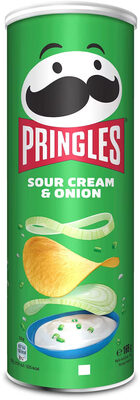
Barcode: 5053990127740
Pringles
DOUBTFUL
📝 Reason: Islamic rulings differ on some components present. Their permissibility depends on factors like animal origin and processing aids not specified here.
🏷️ Category: Plant Based Foods And Beverages, Plant Based Foods, Snacks, Canned Foods, Cereals And Potatoes, Salty Snacks, Appetizers, Chips And Fries, Meals, Crisps, Potato Crisps, Canned Meals, De:Knabbergebäck, De:Knabbergebäck Mit Sauerrahm Und Zwiebelgeschmack
📄 Certificates: Point Vert, Vegetarien
Ingredients:
Details
Is Pringles Halal? Let’s Explore Its Ingredients
In today’s diverse world, Halal certification has become increasingly important for many consumers, particularly those following Islamic dietary laws. One popular snack that often raises questions regarding its Halal status is Pringles. This post delves into the ingredients found in Pringles and evaluates their Halal status to provide you with clear and concise information.
Understanding Halal Status
Halal, which means ‘permissible’ in Arabic, refers to food products that meet specific dietary laws set by Islamic teachings. Packaging, ingredient sourcing, and processing methods all contribute to whether a product can be classified as Halal. For Pringles, the Halal status is currently categorized as DOUBTFUL. Thus, individuals may want to approach this snack with caution.
Ingredients Breakdown
Pringles contain a variety of components, including:
- Mashed potato powder – A starchy tuber that is versatile in cooking and generally permissible in Islam.
- Sunflower oil – This oil is widely accepted as Halal.
- Wheat flour, Corn flour, Rice flour – All these components are recognized as Halal.
- Sour cream onion seasoning:
- Wheat starch – Considered Halal and commonly used in seasonings.
- Flavor enhancers:
- Monosodium glutamate – Widely regarded as permissible in Islam.
- Disodium guanylate – Halal approved.
- Disodium inosinate – Also acceptable.
- Onion powder – A common seasoning, viewed as permissible.
- Dextrose, Table salt, Modified corn starch, Maltodextrin, Sugar, Sour cream powder – All these ingredients are permissible in Islam.
E-Numbers and Their Status
In addition to the listed ingredients, several E-numbers are found within the formulation. Here’s a summary of their Halal status:
- E471 (Emulsifier) – This ingredient can be derived from animal or vegetable sources. Its Halal status can vary, as it depends on the origin. Generally, it is placed under cautious review.
- E334 (Tartaric Acid) – This substance is usually plant-based and considered Halal.
- Colorant (Annatto Norbixin) – Derived from plants and regarded as Halal.
While the majority of the ingredients and E-numbers listed are permissible, the presence of emulsifier (E471) raises a red flag and contributes to the product’s ‘Doubtful’ Halal status. The ambiguity surrounding its source means that this particular ingredient requires further scrutiny before determining if the complete product is Halal.
Brand and Certification Context
Pringles are marketed under various sub-brands, and their formulations can differ by region. While they may not have an explicit Halal certification, understanding the ingredients is crucial. It’s essential to keep an eye out for Halal certifications by reputable bodies as they can provide assurance regarding the suitability of the product for Muslim consumers.
Conclusion
In conclusion, if you’re asking, ‘Is Pringles Halal?’ the answer is not straightforward. While many ingredients are permissible in Islamic law, the questionable source of E471 and the overall status of the product being ‘Doubtful’ necessitate caution. We recommend contacting the manufacturer or looking for certified alternatives if you seek a guaranteed Halal snack option.
